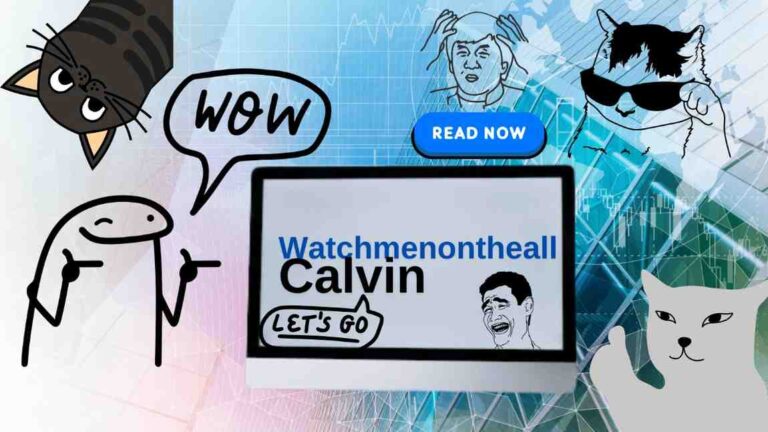In the vast multiverse of computer-related cliquishness, some terms appear as if from nowhere as to give people cause to wonder as well as ponder on some issues. Among such phrases, there is a recent addition to such internet culture known as “watchmenontheall calvin.”
It may look like a bunch of unrelated words but when it comes to online slang and internet culture, it has a significantly more profound meaning – the reflection of philosophy on surveillance bringing in a pinch of rebellion. It is only fitting in this article, that as a modern form of watchmenontheall calvin, we demystify its elements by dissecting it and understanding its origins.

Decoding “Watchmenontheall Calvin”
In the vast context of subcultures that the Internet hosts, some expressions are suddenly popular, and we are not sure how they got there while at the same time, these phrases pose rather stimulating conversations. Among them, there is a phrase that has recently attracted the attention of millions of internet users – “watchmenontheall calvin.”
To understand “watchmenontheall calvin”, we must first take a look at the two primary references within the phrase: Watchmen and Calvin. These connections may appear seemingly random, or even unrelated at that, but when pieced together, one draws a correlation between the order and authority and the complete lack of it.
1. Watchmen: A Dystopian Lens on Surveillance
The term Watchmen is definitely inspired by the name of the twentieth-century postmodernist Watchmen by Alan Moore that was published in 1986. The movie has a group of people who fight crime since superheroes are not allowed in their society.
However, the central idea concerns the concept of surveillance – The Watchmen themselves, like Dr. Manhattan, Rorschach, and Ozymandias try to decide who watches the watchers. Here, the “Watchmen” term means the ones who supervise society and shape its people, making readers face the reality of having someone over their heads and of the concept of morality in such a world.
2. Calvin: Rebellious Freedom from Calvin and Hobbes
On the other side of the spectrum, we’ll have Calvin – the impetuous, young boy torn between being imaginative, intelligent and a bratty little kid from the famous comic strip, Calvin and Hobbes, by Bill Watterson. Calvin is quintessence of freedom and mischief, and desire to rebel against the constraints of the society.
He is a brave-hearted man with a huge imagination and an exceptional tendency to challenge the known system. While the “Watchmen” are all about control and seeing, Calvin is a carefree embodiment of a rejection of those stricture .
The Fusion: “Watchmenontheall Calvin”
Then what if you combined these two disparate elements together? “watchmenontheall calvin” could be read as a metaphor for this historical rift between the pervasive surround we live in and our longing for personal freedom and resistance.
The idea could be that in an age where everything is watched all the time, be it from the government, by a corporation or by a social media platform, we can also have a pushback from people trying to break free from the shackles of being watched all the time.
On one hand, it’s a commentary on modern life, where people are under the “Watchmen’s” gaze all the time, but want freedom to escape or defy the gaze, a little bit like Calvin. This is a digital age allegory — a clash between the design of surveillance and autonomy.
The Role of Memes and Internet Culture

Like any other digital expression, “watchmenontheall calvin” has its own life in the meme area. By nature, memes are a shortcut to encapsulate complex ideas, which most of the time are done in a satirical or nonsensical way. It is no different than ‘ watchmen on the all calvin.’
The phrase has come to be shorthand on internet platforms like Reddit, Twitter and Discord for living in a hyper-connected world in which privacy is increasingly compromised. Like Calvin, it is all about wanting to be seen and heard while it contradicts with needing to hide behind the eyes always watching you (the eyes of digital overseers a la the Watchmen).
These memes work because they tap into universal feelings (frustration with the surveillance state, or longing for digital break free). watchmenontheall calvin also has it’s beauty in the matter of being able to basically, very succinctly, put in something like complex, often contradictory emotions.
Breaking Down the Phrase: A Tabular Insight
To break down “watchmenontheall calvin” more structurally, let’s take apart what this means. Here’s a quick overview of the key elements of the phrase:
| Component | Description | Cultural Significance |
|---|---|---|
| Watchmen | Refers to the graphic novel Watchmen, where a group of vigilantes are tasked with overseeing society. Symbolizes surveillance and control. | Represents a society under constant watch, grappling with the ethics of surveillance and authority. |
| On the all | Suggests being “watched from all angles” or omnipresence. Implies a world of total surveillance or observation. | Reflects the digital age where individuals are under constant observation by governments, corporations, and social media. |
| Calvin | Refers to Calvin from Calvin and Hobbes, a mischievous, free-spirited character who rejects societal norms. | Represents freedom, rebellion, and the desire to escape societal constraints. |
| Fusion | A juxtaposition of the themes of surveillance and rebellion. The tension between the control of Watchmen and the freedom embodied by Calvin. | Highlights the clash between modern surveillance culture and the individual’s need for personal autonomy and freedom. |
| Digital Age Context | The phrase is a reflection of modern digital culture, where constant surveillance (both online and offline) meets individual resistance. | Commentary on privacy, autonomy, and the way digital life shapes human behavior. |
The Impact of “Watchmenontheall Calvin” on Digital Communities
“Watcemenonall calvin” is still resonating with digital subcultures. What makes it interesting is how it might represent complex feelings of disillusionment against the modern surveillance state, while also touching those fantastical places of nostalgia or rebellion with it. Those pop culture references combine into a perfect storm for internet communities to latch into.
“watchmenontheall calvin” has become the mantra of online spaces of philosophy, digital privacy, etc or of general meme culture among those who feel the oppression of surveillance and wish to speak out against the pressures of an increasingly watched world. By speaking as if they embody this phrase users make manifest how the contradictions of modern life are caught between being watched and wanting to be free.
A Glimpse Into the Future: Will “Watchmenontheall Calvin” Persist?
Phrases such as ‘watchmenontheall calvin’ will be built as digital culture expands. And as these technologies advance—from AI to facial recognition to data tracking—we expect that the theme of surveillance versus freedom will have enduring lustre.
While more and more people realise that they are being constantly observed and judged from their digital footprints, this phrase will only gain momentum, becoming insignia for resistance and introspection.
But also, as the internet culture becomes more nuanced, the synthesis of oppositional things, such as who the Watchmen are representing by their surveillance, to the rebellious freedom of Calvin, will only become higher felt. Those who dispute the digital landscape, and more specifically their role in it, may continue to rally under the phrase ‘watchmenontheall calvin’.
Conclusion
Watchmenontheall calvin is more than just an odd combination of words—it’s a digital-age allegory that captures the tension between surveillance and personal freedom, control and rebellion. Drawing inspiration from Watchmen and Calvin and Hobbes, it offers a snapshot of how internet culture processes the complexities of living in a hyper-connected, often over-monitored world.
In the end, “watchmenontheall calvin” isn’t just a phrase—it’s a cultural expression, one that resonates with anyone who has ever felt caught between the gaze of the Watchmen and the wild, untamed spirit of Calvin. It’s a reminder that in the face of an increasingly controlled world, there will always be those who dare to break free.
Frequently Asked Questions (FAQ)
1. What does “watchmenontheall calvin” mean?
“Watchmenontheall calvin” is a phrase that combines two cultural references: Watchmen from the great graphic novel by Alan Moore about surveillance and control and Calvin, from Calvin and Hobbes, which speaks to rebellion and freedom. Most of all, the phrase is a statement about being watched (as with Watchmen) versus a want for freedom (from Calvin) which is a kind of dual tension undergone in our era of cyber control and autonomy.
2. Where did the phrase “watchmenontheall calvin” originate?
Though it seems to have come about naturally as a product of internet meme culture, seeking its inspiration in popular media and digital subcultures. It’s a jumble of references to the Watchmen graphic novel, as well as Calvin and Hobbes, which has made its way into the online conversation around themes such as surveillance and personal freedom.
3. Why is “watchmenontheall calvin” popular in internet culture?
Calvin’s rebellions against fashionable morals are honoured and the preoccupations with surveillance in the digital age are tapped into with the current. It has a powerful meme itself, in space devoted to digital privacy, freedom, and personal autonomy, to anyone who still wants to push back from being watched all the time, under pressure.
4. Is “watchmenontheall calvin” a meme?
‘Watchmenontheall calvin’ has achieved meme culture status: a brief, memeish phrase to describe something more complex about surveillance, control, and rebellion with some humour or thought attractiveness. That is a great example of how memes tend to reduce complex philosophical ideas down to a catchy short saying.
5. How does “watchmenontheall calvin” relate to surveillance?
The Watchmen are figures of a world where people are still watched and controlled symbolizing surveillance and surveillance monitoring through the society. This phrase makes you think in our own digital age that we are being watched by governments, corporations, and social media so many times. Calvin’s free spirit is a statement of desire to escape or rebel from such scrutiny, mirroring surveillance and personal freedom.
6. Can “watchmenontheall calvin” be used as a form of protest?
Absolutely. Some internet users have adopted the phrase as a way of speaking out symbolically against the expanding surveillance in digital life. A rallying cry for those who value privacy and autonomy (and so often complain about how digital systems have taken over our lives), it serves as a tool to express disquiet at the amount of control that digital systems now have over our lives.
7. What does “watchmenontheall calvin” say about our modern society?
The phrase highlights a central paradox of modern life: The era in which we live sees technology and the surveillance system everywhere ‘from all angles’ (like Watchmen), while still wanting personal freedom and the power to rebel against this (Calvin). This also encapsulates the struggle in walking up to a hyper-connected world from a point of view where participants’ privacy is always colliding with the call for oversight and control.
Also, read more articles.

